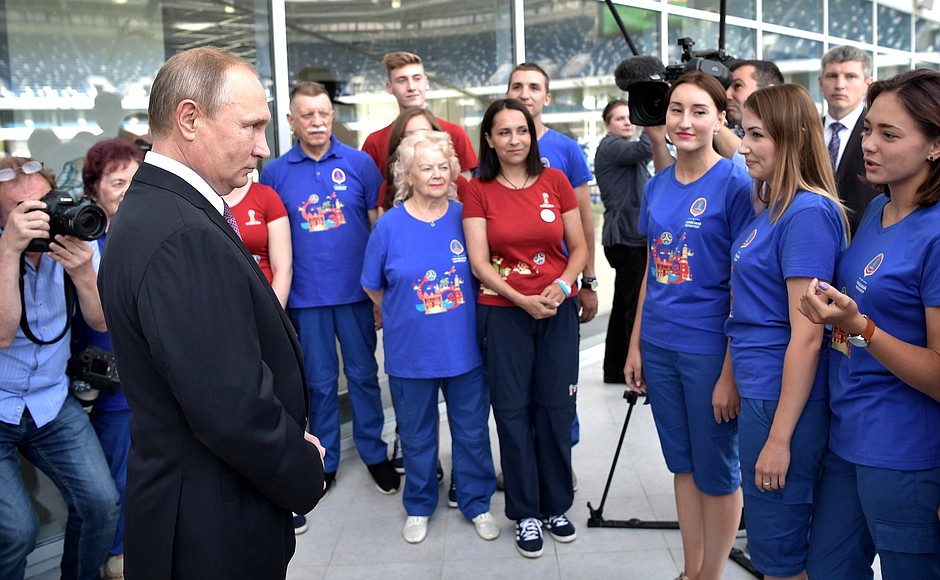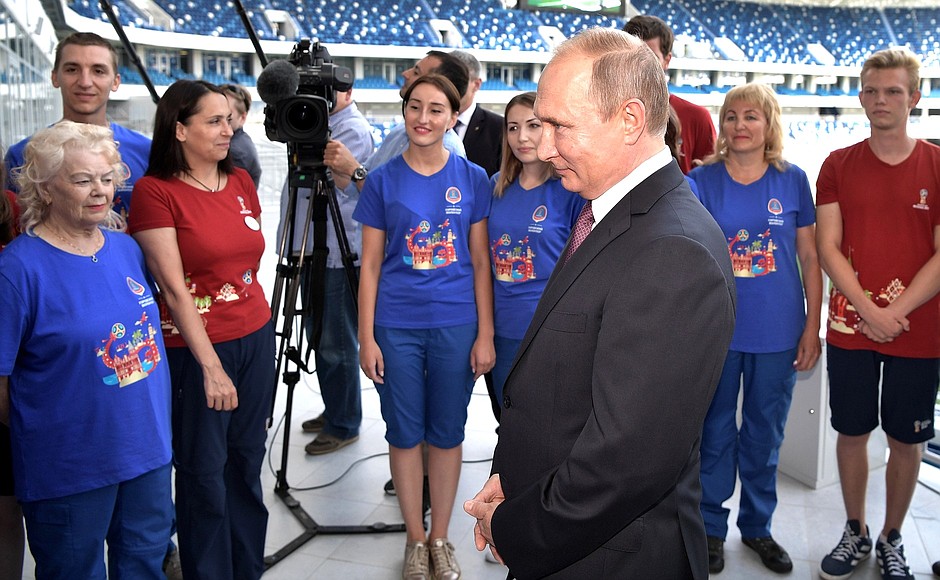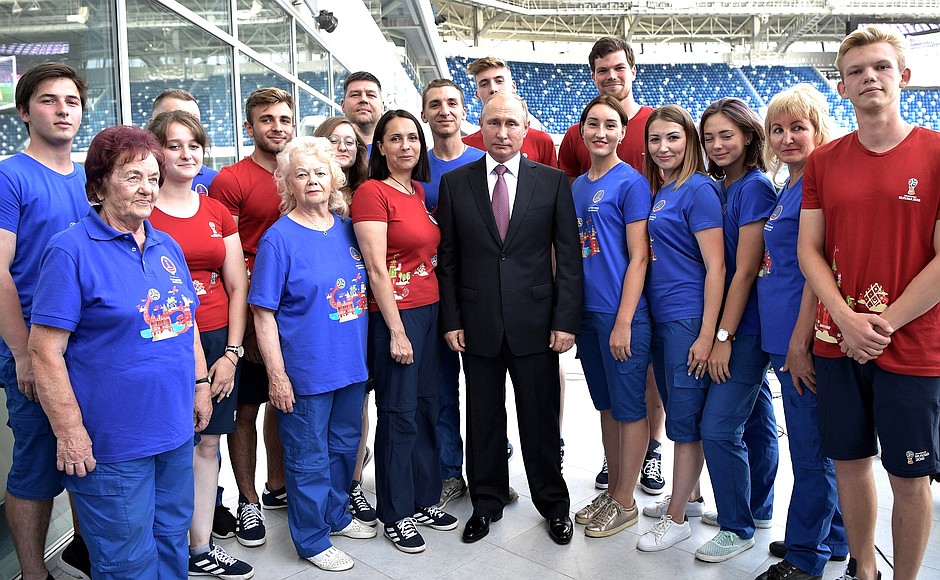President of Russia Vladimir Putin: Hello!
Remark: Good afternoon.
Vladimir Putin: Did you work here?
Remark: Yes, we did. Here and nearby.
Vladimir Putin: I have already mentioned that and would like to say again words of gratitude to the volunteers who are here now and all other volunteers who did such a professional job and put their hearts and souls into the World Cup. You not only did it, but you did a great job. Of course, your contribution was a big part of the success of this World Cup, and I would like to once again thank you for that.
Remark: Thank you.
Vladimir Putin: What other events do you plan to work at as volunteers?
Remark: The Universiade in Krasnoyarsk.
Vladimir Putin: Did any of you do any training?
Remark: We all did. Two years.
Vladimir Putin: Two years?
Remark: Some had it for more than two years, others less, as everyone joined this programme at different times.
Vladimir Putin: All that was not in vain?
Remark: Of course, not.
Vladimir Putin: Who worked here in Kaliningrad?
Remark: Mostly, the red team, people from the organising committee.
Vladimir Putin: It certainly was a big event for the city and the entire region.
Remark: Yes, of course.
Remark: Mr President, I am a great patriot of our Motherland and our city.
Vladimir Putin: You are also a volunteer, correct?
Remark: I am a teacher of Spanish, and when I found out that our city will host the World Cup match between Spain and Morocco, I certainly could not stay away, especially since not so many people in our city speak Spanish. I wanted to be useful, to make new friends, and to tell tourists about our Motherland. So, I met many Spanish speakers, including people from Argentina, Mexico, Colombia and Spain. I wanted Spain to win in the match against Morocco.
Vladimir Putin: But not the match against Russia? (Laughter.)
Remark: I asked people how they like Russia, our city and our people. Everyone had very positive things to say. I said that our people are hospitable and always welcome friends with an open heart. I hope that after this World Cup we will have many new friends in Latin America and all Spanish-speaking countries. I also hope more tourists will come to Russia and our region. I have such a hope.
Vladimir Putin: That is what most likely is going to happen.
Remark: We, volunteers, were the ones who showed them that we are such people.
Vladimir Putin: You heard that I suggested that my colleagues should think it over, and these decisions are now being adopted – we will let Fan ID holders come to Russia without visas until the end of this year.
Remark: Yes, we heard this and it is a good thing.
Vladimir Putin: And members of their families and friends who come with them will get visas free of charge.
Remark: This is great, wonderful.
Vladimir Putin: So we will carry out your plan on increasing the tourist numbers.
Remark: We will only welcome the arrival of openhearted friends in Russia.
Vladimir Putin: Thank you very much.
Remark: It was very difficult not to yield to the temptation and stay at home when such an event is taking place in your country.
I am a teacher of Russian at school and here the vast majority of city volunteers are still in school but were very pleased and eager to work.
Vladimir Putin: I thought you were still in school yourself. (Laughter.)
Remark: No, I am working. I am teaching them. Of course, it was also very important to be with them and share experience, to learn something new. The bottom line is that they displayed such responsibility in performing their duties. I think you will agree with me that our future is in safe hands.
Vladimir Putin: Yes, this is true, judging by the work you did. This is the best evidence.
Remark: I would like to add a few words to what our volunteer said.
I am still in school, next will be my final 11th year. And indeed I must say that I am very happy that such a major event took place in this country, that it has united it once and for all. And I am very glad that not only my peers but people from seniors took part in the event because this is exactly what gives us new experience, new knowledge, emotions and so many new friends.
Vladimir Putin: You should study Spanish then. And other languages as well. (Laughter.)
Question: Mr President, I have the following question for you. This year Russia organised a really important event – the World Cup. My question is this: will Russia host a FIFA World Cup for women?
Vladimir Putin: I think the next FIFA Women's World Cup will take place in France, somewhere in Europe. But why not? We will develop women’s sports in which women were not involved before. Girls are excellent at hockey and football, and getting better all the time. Of course, we will discuss this with FIFA.
Question: Mr President, can I ask you a question not related to sports? Yesterday the State Duma adopted amendments to pension legislation in the first reading. Of course, you monitor the Government’s proposals. It is very important for us to know your opinion on this issue.
Remark: Galina, I do not think we should fear the Pension Fund. We are young and active. The main thing is not to stop but move forward.
Vladimir Putin: Of course, this issue is very sensitive for a large number of our citizens. And, you know, it did not appear just yesterday. It has been discussed with various degrees of intensity during many years. Different options were proposed. And when I was asked in the past, and am asked now, which one I like, I can say: not a single one. I do not like any option that involves increasing the pension age.
And I can assure you, few people in the Government like it. Why? Because the majority of our citizens cannot like it. A person plans to retire, whether to relax or to continue working to receive some additional income, and if this does not happen, people see nothing good. And this is really so.
But what are the experts saying? We should not be guided by emotions but a real assessment of the economic situation, the prospects for its future development, for the development of the social sphere. What do they say? Look. Young people might not be so interested in it, but it still concerns almost everyone.
The decisions on the pension age (55 for women and 60 for men) were made in 1956. I asked, and the Government examined the minutes of the meeting when these decisions were made. You can read what they said. When our colleagues back than made this decision, they said that as demographic indexes and life expectancy go up, so will the retirement age. Let me remind you that the average life expectancy was 67 back then. But nothing was done.
In 1995, another attempt was made. A resolution of the Russian Government was adopted in 1995; I think it was Resolution No. 790. It can be found and read. It says that the pension age must be increased but in the second decade of the 21st century.
It is 2018 now. We, ”the grateful descendants,“ now need to make some decisions. Should we be doing more or not? By and large, we could afford to do nothing for the next five, six, seven or maybe even ten years. As a matter of fact, we have enough resources to maintain the pension system. However, what is the situation now and what will it be in the near, medium and distant future?
Look, I mentioned that the average life expectancy in 1956 was 67. Now, we are up to 73.5 on average. Next year, it will be 74.3. According to estimates – which are most likely accurate – by the end of this transition period (that is 2028, as proposed by the Government), the average life expectancy for men will be over 75. The average life expectancy for women at the end of the transition period (that is 2034) will be over 85.
What does this mean in practical terms? Let’s not go back as far as the 1950s, but in 1970, I believe, there were 3.7 workers per pensioner. Do not be embarrassed by deciles with regard to people, this is statistics. Today, there are two workers per pensioner. That is, almost half what it was in 1970. In other words, there are six workers for every five pensioners. The situation will be changing but not in favour of the workers: their number will decline. There will be a time, and it will come fairly quickly, when the number of workers will equal the number of non-workers and continue to decline, and then either the pension system will collapse, or the budget and reserve funds from which we are currently financing the pension system deficit, will collapse.
Of course, we are faced with many challenges in our economy, but it is running steadily and is expanding, and, generally speaking, it has a large margin of safety. So, if we think not about today, but tomorrow, then, of course, we need to keep all these things in mind.
By the way, even by 2030 (this is forecast data, but fairly reliable), men are expected to have over 15 years after retirement, and women, over 24 years.
You know, this is a sad topic to discuss in a way, but when decisions of this magnitude and sensitivity are made for people, you need to proceed from concrete numbers and rely on realistic professional forecasts.
So there is no final decision yet. The draft law was passed in the first reading, with no amendments or additions. I will certainly listen to all opinions on the subject and follow the discussion which is already unfolding. Naturally, we should listen to people who propose something sound and reasonable and who are governed by the interests of the country and its citizens, instead of people who use this issue, which is sensitive for millions, to gain publicity.
Why? (I will return to citizens’ interests later.) Because if we do nothing at all and if it comes to some serious consequences for the pension system or for the state funds from which it is financed, first of all, we will have to keep retired people’s incomes forever low and they will keep filling the ranks of the so-called poor, while our goal is to raise people’s incomes and reduce the number of poor people. And then, everything might burst, like I said, which could affect those who are affected by raising the retirement age today. So, the current government would simply cheat people, saying, “Everything is fine, we will wait another five, seven, 10 years.”
But that would not be the end of it. We cannot avoid making drastic decisions. But what exactly? I will say again, let’s see how the discussion unfolds, let’s listen to everyone and weigh all these points of view. There are a lot of nuances to it, and I would not like to go into these details now, this is not the right place for it. But we will take it very seriously. First of all, in order to protect our citizens’ interests, both today and for the long term, so that there is stability and dependability in the economy and the social sphere, including the pension system.
Remark: Thank you.
Vladimir Putin: This is a serious issue, so please excuse the monologue.
Question: Mr President, I wanted to follow up on the question posed by my colleague from the organising committee. The World Cup which just ended was, of course, a major sporting event, but it also was, and it is undeniable, an image project and, in particular, an infrastructure project. The World Cup legacy for the host cities includes major urban infrastructure (renovated streets, transport infrastructure and, of course, airports) and world-class sports facilities. Actually, I would like to see these sites continue to host corresponding events.
Vladimir Putin: This is why I am here today – to discuss this subject with my colleagues.
Question: Just over a year ago, last spring, you said that you do not rule out the possibility that some Russian cities will host the Summer Olympic Games.
Vladimir Putin: This is possible, yes.
Question: I just wanted to make sure: you have not changed your mind, have you?
Vladimir Putin: I have not, but we have not formalised the bid yet. So, we need to see where and when, and how much it will cost us. Then, there is a schedule. We will need to discuss it.
Of course, we will continue to organise major international competitions in our country. We will also absolutely need to make good use of the venues that we spend vast amounts of money to build. We did it for the World Cup, but the most important thing, the ultimate goal is not just to throw a party, although this is a great thing to do. Holidays are followed by weekdays, and weekdays must be constructive.
It is important for young people to train here and to make sports a priority for millions of people, so that the forecasts of life expectancy, which we just talked about, come true. This means we should reduce the number of unpredictable mortality factors such as traffic accidents, alcohol, tobacco and drugs.
What do you need to do to rid people of these scourges? Get them athletic and built athletic sites, which we did. Now, we must see to it that they function in a proper way. This is what we are going to talk about today.
Remark: Mr President, we would like to take this opportunity to express our gratitude on behalf of all volunteers for this opportunity to meet you. We appreciate your work and are perfectly aware of your contribution to the development of our country. On behalf of all volunteers, we wish you lots of energy, strength, luck and wisdom.
Vladimir Putin: Thank you very much.


